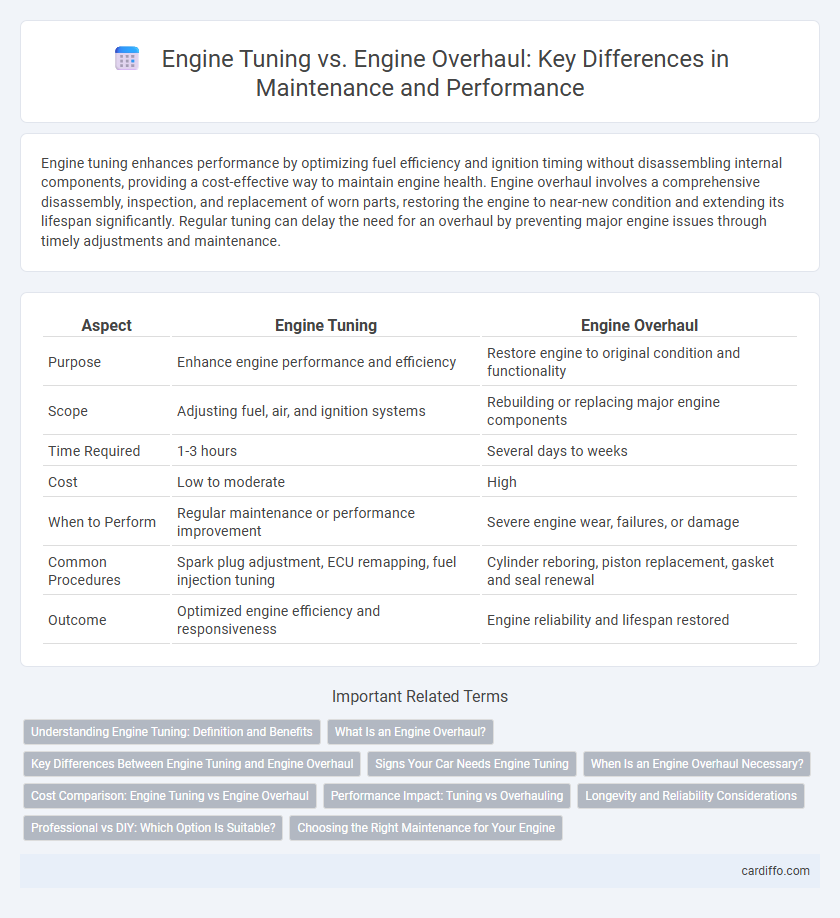Engine tuning enhances performance by optimizing fuel efficiency and ignition timing without disassembling internal components, providing a cost-effective way to maintain engine health. Engine overhaul involves a comprehensive disassembly, inspection, and replacement of worn parts, restoring the engine to near-new condition and extending its lifespan significantly. Regular tuning can delay the need for an overhaul by preventing major engine issues through timely adjustments and maintenance.
Table of Comparison
| Aspect | Engine Tuning | Engine Overhaul |
|---|---|---|
| Purpose | Enhance engine performance and efficiency | Restore engine to original condition and functionality |
| Scope | Adjusting fuel, air, and ignition systems | Rebuilding or replacing major engine components |
| Time Required | 1-3 hours | Several days to weeks |
| Cost | Low to moderate | High |
| When to Perform | Regular maintenance or performance improvement | Severe engine wear, failures, or damage |
| Common Procedures | Spark plug adjustment, ECU remapping, fuel injection tuning | Cylinder reboring, piston replacement, gasket and seal renewal |
| Outcome | Optimized engine efficiency and responsiveness | Engine reliability and lifespan restored |
Understanding Engine Tuning: Definition and Benefits
Engine tuning involves making precise adjustments to the engine's components to optimize performance, fuel efficiency, and emissions without extensive disassembly. This process enhances the engine's responsiveness and longevity by calibrating parameters such as ignition timing, air-fuel mixture, and idle speed. Understanding engine tuning helps owners improve vehicle performance cost-effectively while avoiding the complexity and expense of a full engine overhaul.
What Is an Engine Overhaul?
An engine overhaul involves a comprehensive process of disassembling, inspecting, cleaning, repairing, and reassembling an engine to restore its original performance and efficiency. This procedure addresses worn-out components such as pistons, cylinders, valves, and bearings to ensure optimal engine function and longevity. Unlike engine tuning, which adjusts performance parameters, an overhaul rebuilds the engine from its core mechanical parts.
Key Differences Between Engine Tuning and Engine Overhaul
Engine tuning involves adjusting existing engine components to enhance performance, fuel efficiency, and emissions without dismantling major parts, while engine overhaul includes a comprehensive disassembly, inspection, and replacement of key engine components to restore engine function. Tuning targets optimization of parameters such as ignition timing or fuel injection, whereas an overhaul addresses wear and damage by renewing pistons, valves, and bearings. The scope and cost vary significantly, with engine tuning being less invasive and more cost-effective compared to the extensive labor and parts replacement in an engine overhaul.
Signs Your Car Needs Engine Tuning
Engine tuning is essential when your vehicle exhibits signs such as rough idling, reduced fuel efficiency, or delayed acceleration, indicating misaligned ignition or fuel systems. Unlike a full engine overhaul, which involves extensive disassembly and replacement of internal components due to severe wear or damage, engine tuning optimizes performance through adjustments of spark plugs, air-fuel mixture, and timing. Regular engine tuning helps prevent costly repairs by addressing minor performance issues early, ensuring smoother operation and prolonging engine life.
When Is an Engine Overhaul Necessary?
An engine overhaul becomes necessary when significant wear, internal damage, or loss of performance cannot be resolved through routine engine tuning. Indicators such as excessive oil consumption, loss of compression, unusual noises, and reduced power output signal internal component failure requiring thorough disassembly and replacement of worn parts. Regular engine tuning maintains optimal performance, but an overhaul restores engine integrity after extensive use or mechanical failure.
Cost Comparison: Engine Tuning vs Engine Overhaul
Engine tuning typically costs between $100 and $500, offering a cost-effective way to improve performance and fuel efficiency without major repairs. In contrast, an engine overhaul ranges from $2,500 to $4,000 or more, as it involves extensive disassembly, replacement of worn parts, and restoration of engine components to factory specifications. Choosing between engine tuning and an overhaul depends on the engine's condition, with tuning being a budget-friendly option for minor adjustments and overhauls necessary for severe engine wear or damage.
Performance Impact: Tuning vs Overhauling
Engine tuning enhances performance by adjusting fuel injection, ignition timing, and air-fuel mixture for optimized power and fuel efficiency. In contrast, engine overhauling involves comprehensive repair or replacement of critical components, restoring the engine to near-original condition and resolving severe wear or damage. Performance gains from tuning are immediate and tailored, while overhauling ensures long-term reliability and prevents drastic performance decline.
Longevity and Reliability Considerations
Engine tuning enhances performance and fuel efficiency through precise adjustments, promoting longevity by maintaining optimal engine conditions. In contrast, engine overhaul involves comprehensive disassembly and replacement of worn components, addressing reliability issues caused by extensive wear or damage. Choosing between tuning and overhaul depends on the engine's age, condition, and desired service life to ensure maximum durability and dependable operation.
Professional vs DIY: Which Option Is Suitable?
Professional engine tuning ensures precise adjustments using advanced diagnostic tools for optimal performance, while DIY tuning carries risks of improper calibration and potential engine damage. Engine overhaul requires expert knowledge and specialized equipment to disassemble, inspect, and replace critical components, making professional service the preferred choice for reliability and safety. DIY attempts at engine overhaul often lack the technical precision and resources necessary, leading to incomplete repairs and reduced engine lifespan.
Choosing the Right Maintenance for Your Engine
Engine tuning enhances performance by adjusting fuel-air mixtures and ignition timing, optimizing efficiency without extensive disassembly. Engine overhaul involves comprehensive inspection, cleaning, and replacement of worn components, restoring engine functionality in severely degraded systems. Selecting the appropriate maintenance depends on engine condition, usage intensity, and cost-effectiveness to ensure longevity and peak performance.
Engine Tuning vs Engine Overhaul Infographic

 cardiffo.com
cardiffo.com